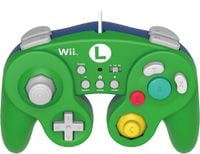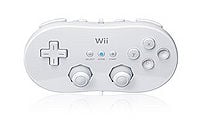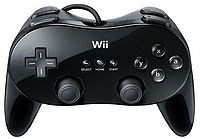Classic Controller: Difference between revisions
EndGenuity (talk | contribs) m (Mh, I've been away for too long.) |
No edit summary |
||
| Line 24: | Line 24: | ||
{|class="wikitable" style="text-align:center" | {|class="wikitable" style="text-align:center" | ||
|- | |- | ||
| | |{{Button|Wii|Control Stick|s=25px}} (left)||[[Move]] | ||
|- | |- | ||
| | |{{Button|WCC|A|s=25px}}||[[Standard attack]]s | ||
|- | |- | ||
| | |{{Button|WCC|B|s=25px}}||[[Special move]]s | ||
|- | |- | ||
| | |{{Button|Wii|Control Stick|s=25px}} (right)||[[Smash attack|Stick-smash]] | ||
|- | |- | ||
| | |{{Button|WCC|X|s=25px}}{{Button|WCC|Y|s=25px}}||[[Jump]] | ||
|- | |- | ||
| | |{{Button|WCC|ZL|s=25px}}{{Button|WCC|ZR|s=25px}}||[[Grab]] | ||
|- | |- | ||
| | |{{Button|WCC|L|s=25px}}{{Button|WCC|R|s=25px}}||[[Shield]] | ||
|- | |- | ||
| | |{{Button|Wii|D-Pad|s=25px}}||[[Taunt]] | ||
|- | |- | ||
| | |{{Button|Wii|Plus|s=25px}}||[[Pause]] | ||
|- | |- | ||
| | |{{Button|Wii|Home|s=25px}}||Home Menu | ||
|- | |- | ||
| | |{{Button|Wii|Minus|s=25px}}||Nothing | ||
|} | |} | ||
| Line 51: | Line 51: | ||
!Control||N64 equivalent||Action | !Control||N64 equivalent||Action | ||
|- | |- | ||
| | |{{Button|Wii|Control Stick|s=25px}} (left)||{{Button|N64|Control Stick|s=25px}}||Move | ||
|- | |- | ||
| | |{{Button|WCC|A|s=25px}}||{{Button|N64|A|s=25px}}||Standard attacks | ||
|- | |- | ||
| | |{{Button|WCC|B|s=25px}}||{{Button|N64|B|s=25px}}||Special moves | ||
|- | |- | ||
| | |{{Button|Wii|Control Stick|s=25px}} (right) {{Button|WCC|X|s=25px}}{{Button|WCC|Y|s=25px}}||{{Button|N64|C|s=25px}}||Jump | ||
|- | |- | ||
| | |{{Button|WCC|ZL|s=25px}}{{Button|WCC|ZR|s=25px}}||{{Button|N64|R|s=25px}}||Grab | ||
|- | |- | ||
| | |{{Button|WCC|L|s=25px}}{{Button|WCC|R|s=25px}}||{{Button|N64|Z|s=25px}}||Shield | ||
|- | |- | ||
| | |{{Button|Wii|D-Pad|s=25px}}||{{Button|N64|L|s=25px}}||Taunt | ||
|- | |- | ||
| | |{{Button|Wii|Plus|s=25px}}||{{Button|N64|Start|s=25px}}||Pause | ||
|- | |- | ||
| | |{{Button|Wii|Home|s=25px}}||Nothing||Home Menu/Operations guide | ||
|- | |- | ||
|Nothing|| | |Nothing||{{Button|N64|D-Pad|s=25px}}||Move ([[menu]] only) | ||
|} | |} | ||
Revision as of 16:13, June 29, 2019
During E3 2006, Nintendo introduced a Classic Controller, which plugs into the Wii remote via a cord in a similar fashion as the Nunchuk. The overall configuration is similar to that of other major seventh generation console controllers, and is also particularly similar to the SNES controller.
The Classic Controller features two analog sticks, a D-pad, a, b, x and y buttons, the L and R shoulder buttons, and two Z buttons (labeled ZL and ZR) next to the L and R buttons, respectively. It also has a set of -, Home, and + buttons like those on the Wii remote.

In 2009, Nintendo released a revision of the Classic Controller named the Classic Controller Pro, with a new wing grip design and the ZL and ZR buttons relocated behind the L and R buttons as secondary shoulder buttons, in the vein of the Z button on the GameCube controller. As it was released after Brawl, the game makes no reference to the new model; all images show the original Classic Controller. However, the controller is fully compatible with Brawl, and is considered superior to its original counterpart by competitive players.
3rd party controller manufacturer PDP, with official licensing from Nintendo, released a "Wired Fight Pad" controller in November 2014, a Classic Controller whose control layout has been redesigned to strongly emulate the look and feel of a Gamecube controller. However, its technical workings are just like any other Classic Controller and as such it connects to the console wirelessly by plugging into the Wii Remote. Owing to its design and release date, some players presume that it is targeted primarily towards Smash Bros. players.[1] Another Gamecube controller-shaped Classic Controller exists on the market, the Hori Battle Pad, which is much closer to the GameCube controller than the PDP Fight Pad. [2]
Despite its similarity to the GameCube controller, it is not compatible with GameCube games, and as such cannot be used to play Super Smash Bros. Melee.
In the Super Smash Bros. series
In Super Smash Bros. Brawl and Super Smash Bros. for Wii U, the Classic Controller can be used as a viable control scheme, along with the standalone Wii Remote, the Wii remote and Nunchuk combination, and the GameCube controller.
The Classic Controller can also be used for Super Smash Bros. by using the Virtual Console.
Standard Controls (Super Smash Bros. Brawl and Super Smash Bros. for Wii U)
| Move | |
| Standard attacks | |
| Special moves | |
| Stick-smash | |
| Jump | |
| Grab | |
| Shield | |
| Taunt | |
| Pause | |
| Home Menu | |
| Nothing |
Standard Controls (Super Smash Bros.)
| Control | N64 equivalent | Action |
|---|---|---|
| Move | ||
| Standard attacks | ||
| Special moves | ||
| Jump | ||
| Grab | ||
| Shield | ||
| Taunt | ||
| Pause | ||
| Nothing | Home Menu/Operations guide | |
| Nothing | Move (menu only) |
References
| Controllers and buttons | |
|---|---|
| Nintendo 64 controller | |
| GameCube controller | |
| Wii Remote (and Nunchuk) | |
| Classic Controller | L |
| Nintendo 3DS | |
| Wii U GamePad / Pro Controller | L |
| Joy-Con | |
| Switch Pro Controller | L |
| Third-party controllers | Hori Mini Pad · Arcade controller · Keyboard |
| Other | Smash Controller · Controller modification |


